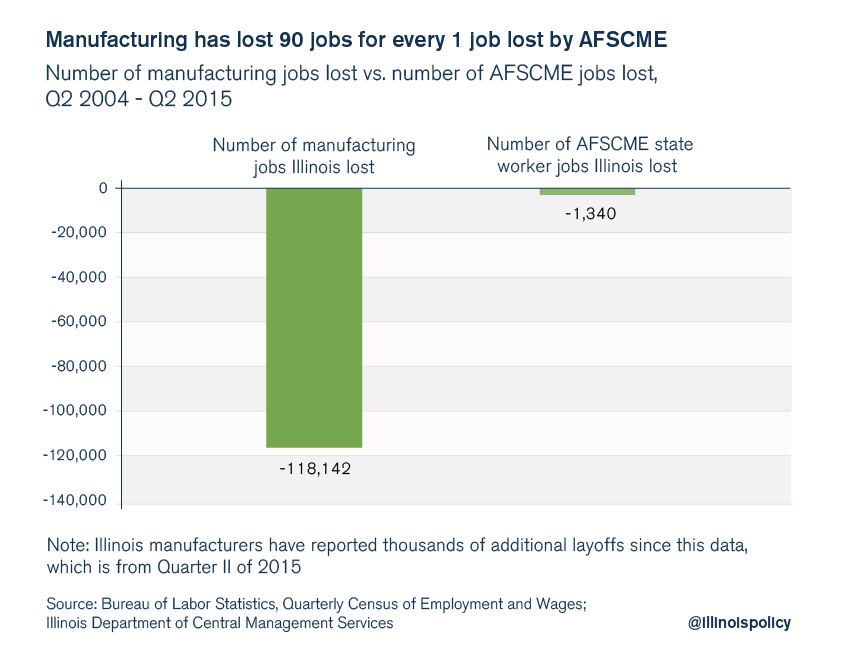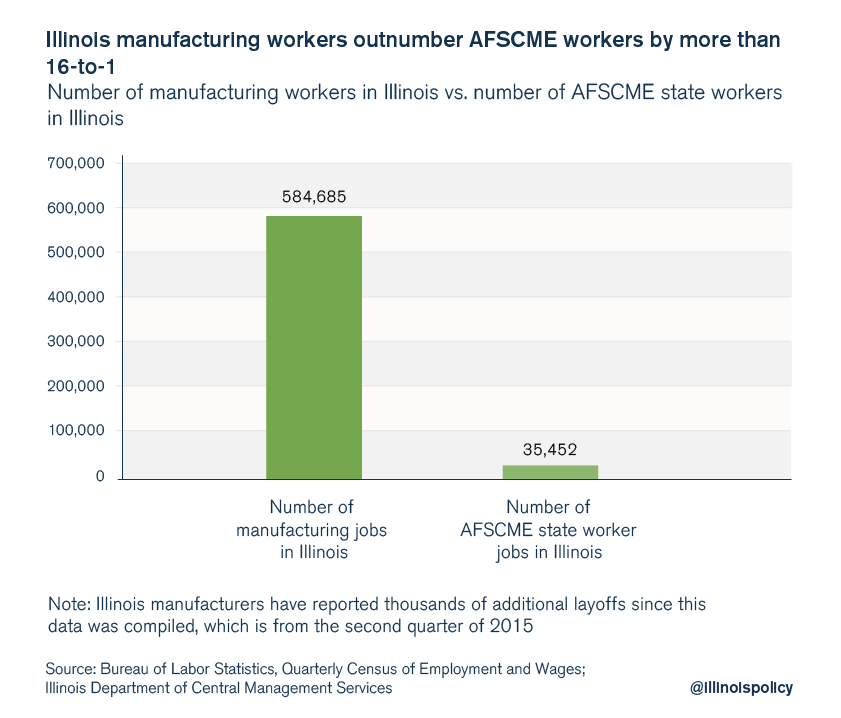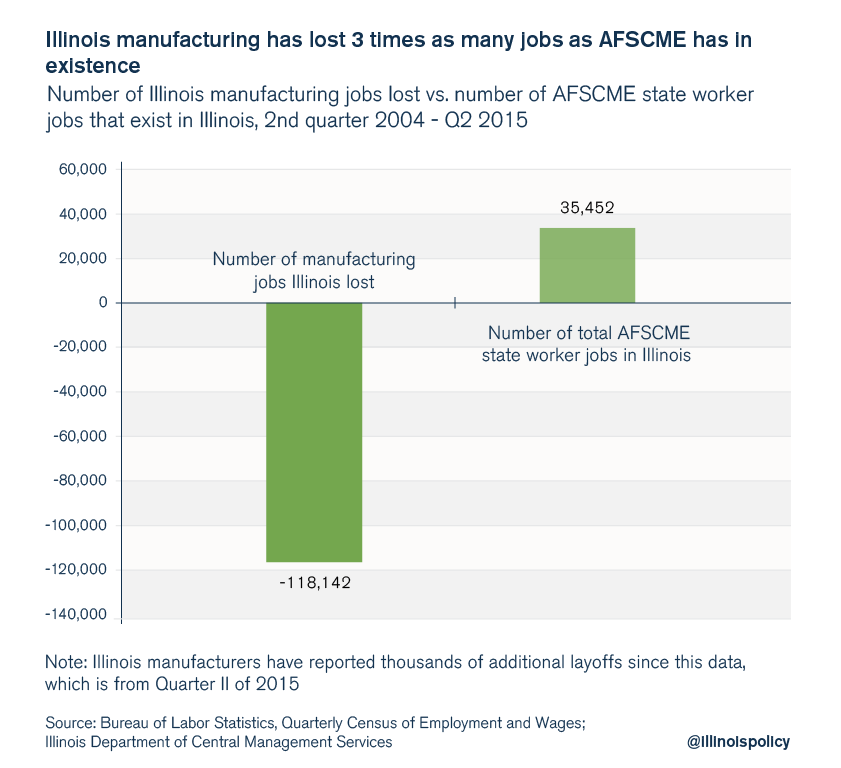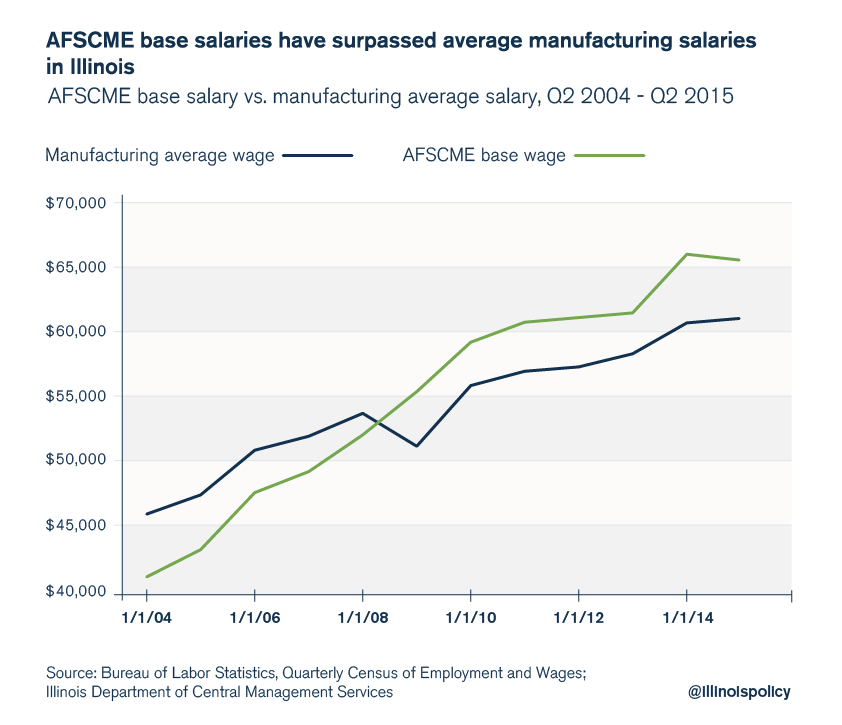HB 580 would give a panel of unelected arbitrators power to approve an AFSCME contract that would cost taxpayers an additional $3 billion over the next four years.
Illinois state government workers represented by the American Federation of State, County and Municipal Employees are doing well, especially when compared with their middle-class counterparts in the private sector whose taxes pay for the salaries and benefits AFSCME members enjoy.
As debate over the AFSCME arbitration legislation, House Bill 580, once again heats up in Springfield, it’s important to remember one particular set of private-sector workers whose plight has been completely ignored by the Illinois General Assembly: Illinois’ manufacturing workers and employers.
The same politicians who are again trying to give AFSCME more goodies have brushed aside the needs of manufacturing workers for years, if not decades.
There are 16 times as many manufacturing workers as AFSCME workers, yet their needs are completely ignored by lawmakers while AFSCME workers are continually appeased. When will politicians focus on Illinois’ real middle class, rather than the demands of the few?
Here are five reasons why it does not make sense for lawmakers to spend so much time trying to legislate arbitration that would result in better benefits for AFSCME and so little time focusing on pro-growth reforms for manufacturing:
- Manufacturing workers dramatically outnumber AFSCME workers in Illinois.
As of 2015’s second quarter, the most recent date when data are available for both workforces, Illinois manufacturing workers outnumbered AFSCME workers 16-to-1.
- Over the last 12 years of data, Illinois manufacturing has lost 90 jobs for every one job AFSCME has lost. Manufacturing has shed nearly 120,000 jobs, while AFSCME has lost 1,300.

There’s another way to look at this. Illinois manufacturing has lost nearly 120,000 jobs since the middle of 2004, while AFSCME accounts for only about 35,000 jobs in total. That means manufacturing has lost more than three times as many jobs as AFSCME currently has.
- Over the last 12 years of data, AFSCME’s base wage has surpassed the average manufacturing wage in Illinois.
In 2004, the average manufacturing wage was $46,228 per year, while the base AFSCME wage, which does not include overtime and bonuses, was $42,854 per year. In 2015, the average manufacturing wage was $61,464 per year, while the base AFSCME wage was $65,824 per year. And that doesn’t even factor in the extremely generous pensions, health care and other benefits AFSCME workers receive from taxpayers.AFSCME’s base salary does not include bonuses or overtime, which are almost certainly worth more than what manufacturing workers receive. And this comparison doesn’t even include health care benefits ($15,000 per year of which are covered by taxpayers, on average), and pension benefits, both of which are undoubtedly far more generous for AFSCME than they are for a private-sector manufacturing worker.
- AFSCME workers get free health insurance and generous pensions when they retire.
The majority of AFSCME workers receive free health insurance from the day they retire and guaranteed pensions worth millions of dollars upon retirement. These are benefits most private-sector workers can only dream of, and most manufacturing workers don’t have.
- When an AFSCME worker has accrued 20 years of service, his entire retiree health insurance premium is covered for his entire retirement. This is worth $200,000-$500,000 per worker.
- When an AFSCME employee retires after 30 years, the employee’s pension is worth $1.6 million on average, 4 percent of which was actually contributed by the employee (8 percent including investment returns).
The middle-class manufacturing workers who don’t receive such luxurious retirements are taxed more heavily so AFSCME workers can receive these extravagant benefits.
- The provisions that exist in AFSCME’s previous contract would put Illinois manufacturers out of business.
Below are examples of provisions in AFSCME’s previous contract. If applied to the private sector, these standards would put many Illinois factories out of business, and put Illinois manufacturing workers out of jobs.
- AFSCME workers aren’t eligible to be fired for absence until they miss five consecutive workdays without reporting to their employer. (Article IX – Discipline)
- When an AFSCME worker gets in trouble, he or she has a predisciplinary hearingduring work hours, and the employee is paid for attending his or her own predisciplinary hearing. (Article IX – Discipline)
- AFSCME workers have 13 paid holidays, including election day, and they receivedouble-time or double-time-and-a-half cash payments if they work a holiday. (Article XI – Holidays)
- AFSCME workers have 5-hour workdays and are not docked for late arrival of up to an hour after starting time unless they are repeatedly late, in which case they may be docked for time. (Article XII – Hours of Work and Overtime)
- AFSCME workers receive overtime pay for travel to training or professional development when the travel is more than their normal commute and outside of their normal hours. (Article XII – Hours of Work and Overtime)
- Seniority rather than productivity is regularly the deciding factor when there are shifts in work assignments or temporary layoffs. (Article XIX – Filling Vacancies and Article XX – Layoff)
- AFSCME workers receive one sick day per month, which carries over from year to year. (Article XXIII – Leaves of Absence)
Despite all of this, AFSCME rejects Gov. Bruce Rauner’s offer, and demands a contract to boost its own pay and benefits even further, which manufacturers have to cover in taxes. And Democrats in the General Assembly seem willing to vote to change the rules of negotiation however AFSCME wants.
AFSCME’s demands should be considered an absolute nonstarter by anyone who cares about the middle class in Illinois – taxpayers such as manufacturing employers and workers who fund AFSCME’s extravagant benefits and pay. The General Assembly should not override Rauner’s veto of HB 580 and for once, should do its job and focus on reforms to help millions of Illinoisans in the private sector who pay for all the benefits enjoyed by government workers.
https://www.illinoispolicy.org/afscme-demands-more-from-taxpayers-while-illinois-middle-class-continues-to-suffer/




No comments:
Post a Comment